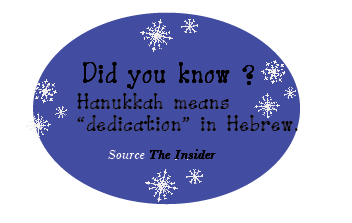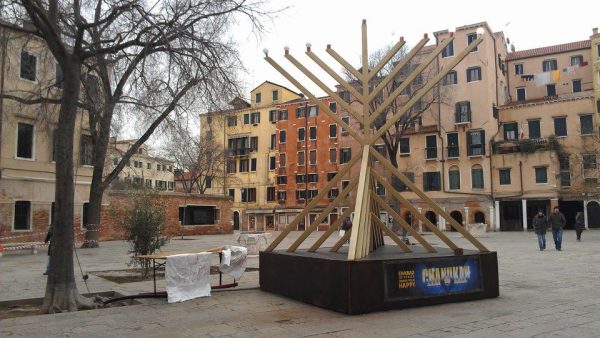While many around the world are aware that Hanukkah falls around the same time as Christmas and have heard the famous song “I Have a Little Dreidel,” how many truly understand the significance and reasons behind the celebration?
Celebrated on the 25th day of Kislev in the Hebrew calendar, Hanukkah typically falls between late November and December and lasts for eight days. Its timing does change each year because Kislev is a holiday on the Hebrew calendar and there are some differences from the Gregorian calendar that the U.S. uses.

Despite not being categorized as one of the major Jewish holidays, Hanukkah holds a rich history and profound meaning for many including substitute teacher Ariana Murray who celebrates it every year.
“Hanukkah is special to me because it’s a big celebration,” Murray said. “Most of the other holidays, especially those that non-Jews are aware of, have some kind of serious component to it. Hanukkah is really just meant to be fun.”
It all began when the Seleucid Empire, a Greek empire, first took over Judea, a region in Jerusalem.
The Seleucids allowed Jewish people to continue practicing their religion. However, in 175 BC, King Antiochus IV Epiphanes gained control of the empire and took away their freedom to practice their religion. He even went to the extreme of beginning a campaign of all-out persecution on Jewish people in Judea.
Fast forward a few years to 167 BC, King Antiochus IV Epiphanes had desecrated the Second Temple, the center of Jewish life in Jerusalem and the province of Judea. He even slaughtered a pig on the altar which then enraged the Jewish people, since pigs are not considered Kosher. Jewish people adhere to the Kosher diet as a way to adhere to their religion. This diet includes fish, eggs, fruits, vegetables, and grains with either meat or dairy, amongst other rules.
Epiphanes’s next move was to transform the temple into a Greek temple, meant for worshiping Greek Gods. This led to the Maccabean Revolt, where Judah Maccabee, son of a Jewish Priest, led a small group of Jews, later known as the
 Maccabees, to rebel against the Seleucid Empire.
Maccabees, to rebel against the Seleucid Empire.
By 164 BC, the group of Maccabees captured Jerusalem and regained authority of the temple. Given the strengths of the Seleucid army, this victory was regarded as astounding and miraculous.
In order for the Jews of Judea to utilize the temple, it needed to be clean and rededicated. While they only had enough oil to light the lamps in the temple for one day, it lasted for eight days. This is why the holiday is celebrated for eight days.
They celebrate in remembrance of this miracle and their perseverance to defend their faith, Hanukkah, also known as the Festival of Lights. The famous menorah, which contains nine candles, is then lit each night of the eight days. The ninth candle is used to kindle the other lights.
Aside from the kindling of the menorah, the celebration of Hanukkah includes prayers, songs, and traditional food such as latkes (potato pancakes). Similar to Christmas, Hanukkah also involves the exchange of gifts.
When it comes to decoration, Hanukkah shares many similarities with Christmas. Individuals decorate by putting up light and tiny decorations around the house. However, all decorations are related to Hanukkah rather than Christmas.
“Most Jews decorate just like others do for Christmas,” Murray said. “(Like) a “Hanukkah bush,” which is basically a Hanukkah-themed Christmas tree.”
In terms of giving, a new gift is given each of the eight nights. Since one present each night can get expensive, many families choose to give one big gift on the first night and smaller ones on the other seven nights.
“My mom gives me a big gift the first night and then sometimes fills in the other nights with handwritten cards or something else small but cute.” Murray said.
These are just a handful of the customs that many Jews observe on Hanukkah. A few years back, Murray had the opportunity
to celebrate Hanukkah in a special manner.

Photo contributed by Murray
Murray traveled to Venice, Italy where she celebrated Hanukkah with Holocaust survivors and children of survivors. Venice is a city rich in history as it is home to some of the oldest ghettos in the world. Ghettos were places where many Jews were compelled to live during the Holocaust.
“Getting to celebrate Hanukkah in Europe has been one of the most amazing experiences of my life,” Murray said. “Venice is home to the oldest ghetto in Europe, and most people who live in Venice are either Holocaust survivors or children of Holocaust survivors. Being able to celebrate any Jewish holiday with someone who survived the Holocaust is unbelievable.”
Murray also had the chance to celebrate in Malta, a country in Europe with one of the oldest Jewish communities. Murray observed how the locals took great pride in their heritage. .
“Both experiences made me appreciate Hanukkah more because I saw the holiday and its meaning through other Jewish people’s eyes – people who have seen so much more than me,” Murray said.

